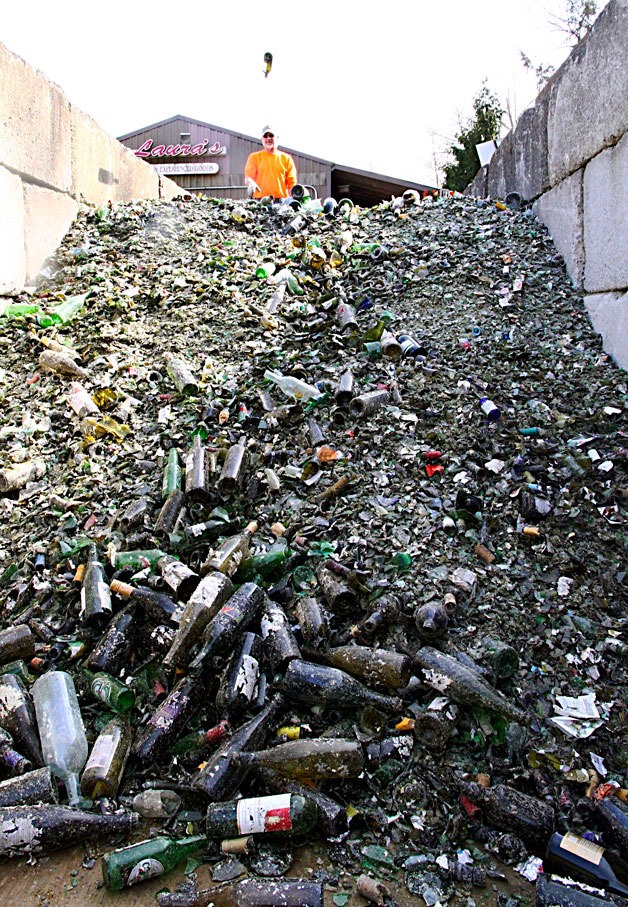Like many Whidbey Island residents, you probably support recycling, but have you ever wondered what becomes of, say, that fabulous bottle of wine you enjoyed after it’s dropped into your curbside recycling container?
Trick question!
Under newly unified county-wide rules, you aren’t allowed to put glass into the curbside recycling containers managed by Coupeville, Oak Harbor or Hunt Companies-owned Navy housing. That’s because if the glass breaks, it can contaminate all the bin’s other contents, rendering them worthless.
“The extra processing required to remove the contaminating glass isn’t worthwhile, economically,” said Gene Clark, the county’s recycling and hazardous-waste coordinator,
OK, start again. You’ve polished off that luscious Washington Cabernet Sauvignon and brought it to one of the island’s four recycling centers — in Bayview, Coupeville, Freeland and Oak Harbor — or to one of its eight unattended glass-collection points. No matter where you drop off the bottle, it ends up at Island Recycling, a locally owned business in Freeland, packed into 20-cubic-yard metal containers.
Island Recycling contracts to pick up and process all recycled materials from the three county-run recycling facilities. It also runs its own center, in Freeland.
Last year the company collected 4,953 tons of recyclable material and received $202,000 from the county.
Recyclables from curbside pick-up programs are collected and dealt with by a different company, Island Disposal, a subsidiary of Waste Connections Inc., of The Woodlands, Texas.
In Freeland, the glass, which you have kindly sorted by color, is dumped into three pits — one each for clear, green and brown — and smashed to bits by a front-end loader. It’s then trucked south to Strategic Materials Inc., a Houston-based company with a facility in Seattle. There, magnets and sorters eliminate ceramic bits, stones, metals and other foreign material. Crushers and screens size the material either to 5/8-inch chunks, for use in containers, or to fine powder, for use in fiberglass and other products. Then it is used in fiberglass insulation, new bottles, reflective glass-bead highway markings, abrasives or filler material in paint.
As to the other recyclables, baled aluminum, baled plastics and baled cardboard, newspaper and mixed paper all go to Fibers International in Everett for processing and redistribution all around the world, Clark said. Baled tin cans go to Nucor Steel Seattle Inc. to be melted down and used in steel.
Island Disposal, the company that performs curbside pick-ups, handles its recyclables differently, Clark said. It bales them all together and trucks them down to Pioneer Recycling in Tacoma, which separates the materials and sells them off.
Who’s making money off recycling? Certainly not the county, which runs its recycling programs at a loss.
“The people who don’t make money are the governments and agencies trying to get recyclables out of the waste stream,” Clark said.
Island Recycling, with 12 employees plus owners Dave Campbell and Jill, “isn’t profitable right now, because the markets are terrible” for raw recycled goods, he said.
“It’s the worst since 2008, and it’s been this way all year. But it was profitable and it will be again, I’m sure.”
By the way, under the newly unified recycling rules, the curbside pick-up programs, as well as all drop-off sites on the island, now also accept:
Empty, clean plastic bottles, jugs, plastic jars and tubs, except that clean plastic plant pots and clean five-gallon buckets are accepted at curbside only;
• Empty, rinsed tinned steel and aluminum containers and their lids. Labels may be left on.
All recycling pick-up and drop-off facilities now also refuse to take:
• Caps and lids, toxic-product containers, Styrofoam, pill bottles, plastic cups, film plastic including bags, visqueen and stretch wrap, deli trays, clamshells, thermoform plastic packaging, PVC pipe and bulk ridged plastic such as laundry baskets, toys and lawn furniture.
• Used napkins, paper towels, cups and plates, tissue paper, waxed cardboard, poly-coated milk and juice cartons, and aseptic or Tetra Pak cartons.
• Foil food and juice pouches, aerosol cans, aluminum foil, foil pans and foil trays.
The rules were unified to reduce confusion among consumers, who until now have had to follow different rules at different facilities.
The glass-collection points are located in Oak Harbor at the Safeway and the Office Max parking lots and the marina, at Coupeville Public Works and at four locations within Forrest City naval housing.
For recycling-facility locations, see www.islandcounty.net/PublicWorks/Solidwaste/



